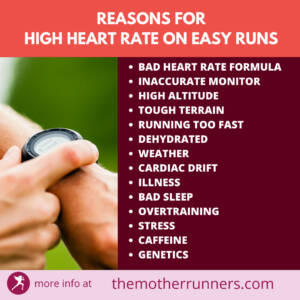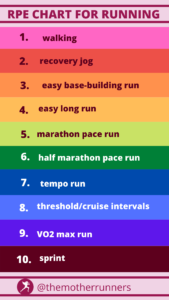Your heart rate can be high on easy runs for various reasons such as nutrition, stress, menstrual cycle, illness, weather, genetics and, lack of sleep. In most cases, a high heart rate when running easy is not a cause for concern, Kate Baird, exercise physiologist at the Hospital for Special Surgery, unless it is very high or is suddenly consistently high. Read on to learn more about reasons and solutions for a high heart rate when running.

I have had so many athletes I coach ask me: why is my heart rate high on easy runs? It’s a super valid question as training by heart rate is very popular right now.
Running by heart rate can be a good indicator of whether you are staying true to your training zones, especially on easy runs! So many runners from experienced runners to beginner runners run their easy runs too fast.
Part of the issue is that when they started running, running felt hard no matter what pace they were running. So, as they got fitter, they continued the same effort level. However, as your body becomes more efficient, your heart rate should lower on easy runs. The other part is that gym culture promotes high heart rate training in the form of things like HIIT workouts.
But in running, you want to do most of your training in a low heart rate zone. Because this allows you to run more without getting injured. Your body still develops the physiological changes needed to become better runners such as increased capillary density, blood volume, mitochondria, and glycogen storage, even when running at a slow pace.
Jump Ahead
Related: The Benefits of an Easy Run Pace
The problem with running at a high heart rate
The sport of running has a high injury rate in part because people go out and run too fast too often. In most cases, 80 percent of your running mileage should be done at an easy pace.
Still, there are people who have high heart rates even when they are truly running easy. Hallmarks of an easy running pace are being able to hold a conversation and feeling like you can run all day.
Yet for many of my athletes, I use past race performances to dictate pace zones for easy runs—and several of them stay true to the zones with heart rates near their maximum heart rate zones.
What gives?
I got with Kate Baird, exercise physiologist at the Hospital for Special Surgery in New York, to explain why your heart rate is high on easy runs.
Related: Elevated Heart Rate When Running After COVID
In this article, I will cover:
- The 15 reasons why your heart rate is high on easy runs
- How you can lower your heart rate when running
- When should you stop running because of high heart rate
- And when should you be concerned about a high heart rate when running
Please note, I am not a doctor so if you are concerned about your heart rate running, go see one!
Let’s get going!
What is a normal heart rate?
A normal resting heart rate for an adult can be between 60 and 100 beats per minute.
For runners, an average heart rate at rest (or how many times your heart beats per minute) may lie between 40 and 60 bpm. Some runners heart rate lies in the 30s. Indeed, there have been times my resting heart rate has been in the upper 30s.

How do I calculate my heart rate zones?
Heart rate zones are percentages of your maximum heart rate that are supposed to coincide with your effort level.
Heart rate training zones:
- Zone 1: 50-60% percentage of maximum heart rate
- Zone 2: 60-70%
- Zone 3: 70-80%
- Zone 4: 80-90%
- Zone 5: 90-100%
The most accurate way to get your heart rate zones is a VO2 Max test done in a lab. However, there are many formulas to calculate someone’s heart rate zones, but one of the most accurate formulas is:
- Maximum Heart Rate for Males = 208.609-0.716 x age
- Maximum Heart Rate for Females = 209.273-0.804 x age
Why is my heart rate high on easy runs?
Okay, now knowing what your heart rate training zones are—why is your heart rate high on easy days. Here are 14 possible reasons.
15 Reasons Your High Heart Rate is on Easy Runs
-
Running too fast.
Let’s start with the most obvious answer that a lot of runners don’t want to face—they are running too fast on their easy runs.
Running is hard work and it feels hard when we start. So as our bodies adapt, we quicken the pace, thinking that running is always supposed to feel hard. That’s not the case!
For most of your runs, it should feel easy. You should be able to talk and feel like you can run forever at your easy pace.
Anecdotally, many of my newer runners, or runners returning after a long layoff, have heart rates that are higher than what they are used to. They adjust by slowing down which lowers heart rate. In a couple of months, the relationship between pace and heart rates normalize.
Solution: Try running at a slower pace in your normal training runs and see how you feel. I like listening to podcasts vs. music to help me slow down or run early in the morning when I am still waking up.
You can also run with a friend to ensure you run at conversational pace. Take walk breaks as needed to lower your heart rate.
Related: How to Start Running in the Morning
-
Inaccurate heart rate formula.
The most common heart rate formula people use is 220 minus your age to get your max heart rate, then they calculate zones based on percentages.
This isn’t a very accurate measure for most people as age is one of a number of factors that determines your heart rate, says Baird.
“There is incredible variation in heart rate among individuals due to factors such as sex, age, fitness level, health considerations, and lifestyle. These all contribute to a person’s heart rate at rest, during exercise, and maximally,” she explains.
For example, I am 42, which means my max should be 178. According to this formula, my heart rate should be around 115 on my easy runs. Well, I would basically be walking to keep my heart rate in that zone.
Solution: Use the formula I mentioned above to calculate your heart rate zones instead.

-
Heart rate monitor inaccuracy.
Heart rate monitors can be wildly inaccurate, especially wrist-based monitors—by as much as 14 percent.
Factors such as fit (too loose, too tight, or too high or low on the wrist) can contribute to inaccuracy of heart rate readings as well as grind build-up on the metal sensors from sweat and dirt.
To ensure accuracy, wipe down the metal touchpoints regularly and ensure you are wearing your GPS watch in the appropriate position according to your brand. It usually sits above your wrist bone and you can fit your index finger snugly under the strap, but it doesn’t shake around.
An arm strap or chest strap heart rate monitor are typically more accurate than wrist-based heart rate monitors.
Solution: Invest in a chest-based HR monitor.
Related: Your Garmin Metrics Explained
-
Illness.
If you’re sick or getting sick, your heart rate may be higher when running. Your body temperature rises as your body works to kill germs. For reach degree centigrade above your normal core body temperature, your heart rate will increase 10 bpm.
Solution: Focus on rest, good nutrition, and hydration so you can recover. (Consider taking an immune supplement like Previnex Immune Health Plus to help you fight germs. Save 15% with code TMR15).
Related: Should You Run When You’re Sick?
-
Tough terrain
If you’re running on hard terrain, such as rocky trails or hilly routes, your muscles will be working harder, and you’ll be working different muscle groups than usual. This requires more oxygen to be supplied to your muscles which means your heart has to beat harder.
Solution: You know the reason, so don’t worry about it! Or just scale back your pace.
Related: How to Run Downhill
-
Stress
Being stressed, either episodically or chronically, increases stress hormones in the body which signal an increase in blood pressure, respiratory rate, and heart rate. Deficiencies related to stress can also raise heart rate.
This is because your body is preparing you to respond to a threatening situation aka the fight or flight response.
Solution: Aim to integrate a few minutes of each day to be still and in touch with your body. Try something like the Calm app, journaling, or yoga.
Related: What is Intuitive Running?
-
Overtraining

The cousin of chronic stress is overtraining syndrome. Overtraining syndrome occurs when you’re running more than your body can recover from.
One of the symptoms of overtraining is an elevated resting heart rate (RHR) for an extended time. If your RHR is higher, than your working heart rate will likely be higher.
Solution: Scale back your training or take a break for a week or two, and see how you feel.
It’s a good idea to regularly take your resting heart rate first thing in a morning to monitor how well you are recovering.
Related: Why You Should Take a Break from Running
-
Weather
Blame it on the rain, yeeeahhh yeah. Sorry…No, don’t blame it on the rain, but blame it on the heat and humidity which can cause your body to work harder to get oxygen to your muscles while keeping your body cool.
But keeping your body cool in humidity is hard because your sweat doesn’t evaporate—which is what needs to happen for it to cool. Therefore, your heart beats even harder working overtime.
Solution: Take measures to pre-cool your body, seek shady routes, and hydrate with cold sports drinks.
Related: Why Running in Humidity is Hard
-
Dehydration
If you are dehydrated from running in hot and humid conditions as well as running in cold weather, your heart rate will go up 3-5 beats per minute for every 1% of body mass. This is because your blood volume is lower, so your heart has to work harder to circulate it.
Solution: Aim to drink about 16 ounces of fluids per hour of running, give or take. Pre-hydrate with 12-16 ounces and replenish bodyweight lost after your run.
Related: Your Hydration Guide for Runners
-
Caffeine
If you drink a cup of coffee (or two or three) before running, your heart rate may be higher as caffeine can raise your heart rate.
Drinking coffee before running is a great performance aid but there can be too much of a good thing.
Solution: Consider cutting back your intake by a cup or so. Side effects from too much caffeine can make your run feel harder. You should aim to have 2-5 mg of caffeine per kilogram of bodyweight.
Related: Should Runners Drink Coffee Before Running?
-
High Altitudes
If you are running in high elevations and aren’t used to it, then expect a higher heart rate when running. Your body has less oxygen in the air to breathe in and transport to muscles.
Therefore, your heart must beat harder to get that oxygen moving throughout the body.
Solution: Exposure to altitude will help you acclimate. Be sure to hydrate well and take it extra easy on your runs.
-
Tiredness
If you had a bad night’s sleep, your heart rate could be higher by at 2-4 beats per minute.
This is because lack of sleep can increase stress hormones, which as we learned, can trigger the fight or flight response in your body.
Solution: Try to optimize sleep as best you can by getting to bed at the same time, keeping the room cool and dark, and staying away from screens and caffeine in the hours before bedtime. Take naps as needed (before 2 pm).
Related: The Importance of Sleep for Runners
-
Cardiac Drift

Cardiac drift is when your heart rate naturally gets higher the longer you run, despite effort and/or pace staying the same.
This is most common during long runs as the body becomes fatigued, stroke volume (how much blood your body pumps out with each beat), and cardiac output (the blood your heart circulates throughout the body in in a minute), progressively declines. Your heart must work harder and therefore, your heart rate goes up.
Solution: Keep on running! Your heart’s left ventricle become larger and stronger with consistent training runs. This will increase your stroke volume and cardiac output, lowering your cardiac drift.
-
Genetics
Some people just have higher heart rates, says Baird. Blame your DNA.
If you didn’t check any of the boxes above, then there is a good chance that your heart rate is naturally higher because of your genetics.
Solution: Run by RPE (Rate of Perceived Exertion) instead!
Running by RPE is paying attention to your breath, sweat rate, heart rate, and muscle fatigue when running and adjusting your pace to stay in range.

To run easy, you should notice how hard you are breathing and whether you can talk, says Baird. When running easy, you should be able to speak in complete sentences and carry on a conversation.
Related: What is RPE in Running?
15. Hormones
Hormonal fluctuations during your menstrual cycle can also affect heart rate. Your heart rate may increase slightly during ovulation and the week afterward (luteal phase). It may decrease a bit during your period and the week afterward (follicular phase).
Solution: Sync your cycle.
You can tailor your training to match your cycle in what is called cycle syncing if a higher heart rate and higher effort is impacting your training. With this, down weeks are timed during your PMS or period phases.
What are steps they can take to lower their HR?
The cool thing, says Baird, is that over time and with consistent running, your heart rate will naturally lower at a given pace.
“That is because your body has become more conditioned and you do not need the heart to pump quite as fast to meet the demand of the running pace,” she says.
With consistent and appropriately progressed exercise the heart will become stronger and better able to fill and pump blood (increasing stroke volume, or the amount of blood pumped out of the left ventricle with each beat).
More blood means fewer overall heart beats to meet the demands of a certain running pace and therefore, lower heart rate. This is your heart adapting to your training and becoming more efficient, which is great for us!
When should you stop running due to a high heart rate?
Your heart rate will be high for high-intensity, hard workouts such as VO2 max intervals. If you cannot catch your breath, then it is advisable to stop running, take a break, or reassess your workout.
If your running heart rate is regularly higher than it should be given your schedule running workout, then it would be a good idea to consult your doctor.
When should they see a doctor?
Baird reminds runners to get an annual physical to monitor overall health.
If you have heartbeat-related concerns such as an irregular heartbeat, palpitations, a resting heart rate that is consistently too slow or too fast, or chest pain, see your doctor sooner rather than later!
If you want guidance with your running goals, including fueling, check out my run coaching services. Also, be sure to check out my free training plans:
- Postpartum Training Plan
- After a Break Training Plan
- 5k Training Plans
- 10k Training Plans
- Half Marathon Training Plans
- Marathon Training Plans
- Strength Training Plan
